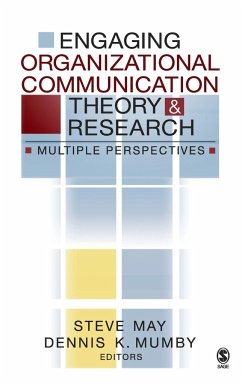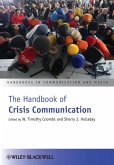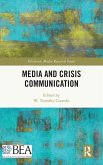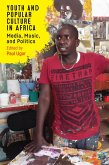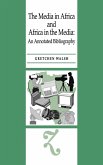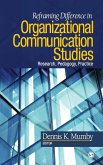Steve May, Dennis K. Mumby
Engaging Organizational Communication Theory and Research
Multiple Perspectives
Steve May, Dennis K. Mumby
Engaging Organizational Communication Theory and Research
Multiple Perspectives
- Gebundenes Buch
- Merkliste
- Auf die Merkliste
- Bewerten Bewerten
- Teilen
- Produkt teilen
- Produkterinnerung
- Produkterinnerung
Engaging Organizational Communication Theory and Research: Multiple Perspectives is a book unlike any in the field. Each chapter is written by a prominent scholar who presents a theoretical perspective and discusses how he or she "engages" with it, personally examining what it means to study organizations. Rejecting the traditional model of a "reader," this volume demonstrates the intimate connections among theory, research, and personal experience. Engaging Organizational Communication Theory and Research is an indispensable resource for anyone wishing to be familiar with current trends in the field of organizational communication.…mehr
Andere Kunden interessierten sich auch für
![Stretching Boundaries: Cases in Organizational and Managerial Communication Stretching Boundaries: Cases in Organizational and Managerial Communication]() Stretching Boundaries: Cases in Organizational and Managerial Communication196,99 €
Stretching Boundaries: Cases in Organizational and Managerial Communication196,99 €![The Handbook of Crisis Communication The Handbook of Crisis Communication]() The Handbook of Crisis Communication72,99 €
The Handbook of Crisis Communication72,99 €![Media and Crisis Communication Media and Crisis Communication]() Media and Crisis Communication198,99 €
Media and Crisis Communication198,99 €![Youth and Popular Culture in Africa Youth and Popular Culture in Africa]() Youth and Popular Culture in Africa183,99 €
Youth and Popular Culture in Africa183,99 €![Engaging and Transforming Global Communication through Cultural Discourse Analysis Engaging and Transforming Global Communication through Cultural Discourse Analysis]() Engaging and Transforming Global Communication through Cultural Discourse Analysis165,99 €
Engaging and Transforming Global Communication through Cultural Discourse Analysis165,99 €![The Media in Africa and Africa in the Media The Media in Africa and Africa in the Media]() The Media in Africa and Africa in the Media149,99 €
The Media in Africa and Africa in the Media149,99 €![Reframing Difference in Organizational Communication Studies Reframing Difference in Organizational Communication Studies]() Dennis K. MumbyReframing Difference in Organizational Communication Studies158,99 €
Dennis K. MumbyReframing Difference in Organizational Communication Studies158,99 €-
-
-
Engaging Organizational Communication Theory and Research: Multiple Perspectives is a book unlike any in the field. Each chapter is written by a prominent scholar who presents a theoretical perspective and discusses how he or she "engages" with it, personally examining what it means to study organizations. Rejecting the traditional model of a "reader," this volume demonstrates the intimate connections among theory, research, and personal experience. Engaging Organizational Communication Theory and Research is an indispensable resource for anyone wishing to be familiar with current trends in the field of organizational communication.
Hinweis: Dieser Artikel kann nur an eine deutsche Lieferadresse ausgeliefert werden.
Hinweis: Dieser Artikel kann nur an eine deutsche Lieferadresse ausgeliefert werden.
Produktdetails
- Produktdetails
- Verlag: Sage Publications, Inc
- Seitenzahl: 322
- Erscheinungstermin: 28. Oktober 2004
- Englisch
- Abmessung: 235mm x 157mm x 22mm
- Gewicht: 619g
- ISBN-13: 9780761928485
- ISBN-10: 0761928480
- Artikelnr.: 21736313
- Herstellerkennzeichnung
- Libri GmbH
- Europaallee 1
- 36244 Bad Hersfeld
- gpsr@libri.de
- Verlag: Sage Publications, Inc
- Seitenzahl: 322
- Erscheinungstermin: 28. Oktober 2004
- Englisch
- Abmessung: 235mm x 157mm x 22mm
- Gewicht: 619g
- ISBN-13: 9780761928485
- ISBN-10: 0761928480
- Artikelnr.: 21736313
- Herstellerkennzeichnung
- Libri GmbH
- Europaallee 1
- 36244 Bad Hersfeld
- gpsr@libri.de
Steve May (Ph.D., University of Utah, 1993) is Associate Professor in the Department of Communication Studies at the University of North Carolina at Chapel Hill. He is a Leadership Fellow at the Institute for the Arts and the Humanities, an Ethics Fellow at the Parr Center for Ethics, and a researcher and ethics consultant for the Ethics at Work program at the Kenan Institute for Ethics He is co-editor, with George Cheney and Debashish Munshi, of The Handbook of Communication Ethics and, with Oyvind Ihlen and Jennifer Bartlett, of The Handbook of Communication and Corporate Social Responsibility. His organizational communication research has been published in journals such as Management Communication Quarterly, Journal of Applied Communication Research, Rhetoric and Public Affairs, Public Policy Yearbook, and Organizational Communication: Emerging Perspectives. He is a past Forum Editor of Management Communication Quarterly and Associate Editor of The Journal of Applied Communication Research and The Journal of Business Communication. Dennis K. Mumby is the Cary C. Boshamer Distinguished Professor of Communication at The University of North Carolina at Chapel Hill, USA. His research focuses on the communicative dynamics of organizational control and resistance under neoliberalism. He is a Fellow of the International Communication Association, and a National Communication Association Distinguished Scholar. He has authored or edited 7 books and over 60 articles in the area of critical organization studies, and his work has appeared in journals such as Academy of Management Review, Management Communication Quarterly, Organization Studies, Organization, and Human Relations. He is past chair of the Organizational Communication Division of NCA, and an 8-time winner of the division's annual research award. He has served as chair of the Organizational Communication Division of the International Communication Association, and is a recipient of the division's Fredric M. Jablin Award for contributions to the field of organizational communication.
1. Introduction: Thinking about Engagement - Dennis K. Mumby and Steve May
2. Postpositivism - Steven R. Corman
3. Social Constructionism - Brenda J. Allen
4. Theorizing about Rhetoric and Organizations: Classical, Interpretive,
and Critical Aspects - George Cheney with Daniel J. Lair
5. Critical Theory - Stanley Deetz
6. Postmodern Theory - Bryan C. Taylor
7. Feminist Organizational Communication Studies: Engaging Gender in Public
and Private - Karen Lee Ashcraft
8. Structuration Theory - Marshall Scott Poole and Robert D. McPhee
9. Worldview: My Pursuit of an Explanation of Communication as Organizing -
James R. Taylor
10. Globalization Theory - Cynthia Stohl
11. Conclusion: Engaging the Future of Organizational Communication Theory
and Research - Steve May and Dennis K. Mumby
Author Index
Subject Index
About the Editors
About the Contributors
2. Postpositivism - Steven R. Corman
3. Social Constructionism - Brenda J. Allen
4. Theorizing about Rhetoric and Organizations: Classical, Interpretive,
and Critical Aspects - George Cheney with Daniel J. Lair
5. Critical Theory - Stanley Deetz
6. Postmodern Theory - Bryan C. Taylor
7. Feminist Organizational Communication Studies: Engaging Gender in Public
and Private - Karen Lee Ashcraft
8. Structuration Theory - Marshall Scott Poole and Robert D. McPhee
9. Worldview: My Pursuit of an Explanation of Communication as Organizing -
James R. Taylor
10. Globalization Theory - Cynthia Stohl
11. Conclusion: Engaging the Future of Organizational Communication Theory
and Research - Steve May and Dennis K. Mumby
Author Index
Subject Index
About the Editors
About the Contributors
1. Introduction: Thinking about Engagement - Dennis K. Mumby and Steve May
2. Postpositivism - Steven R. Corman
3. Social Constructionism - Brenda J. Allen
4. Theorizing about Rhetoric and Organizations: Classical, Interpretive, and Critical Aspects - George Cheney with Daniel J. Lair
5. Critical Theory - Stanley Deetz
6. Postmodern Theory - Bryan C. Taylor
7. Feminist Organizational Communication Studies: Engaging Gender in Public and Private - Karen Lee Ashcraft
8. Structuration Theory - Marshall Scott Poole and Robert D. McPhee
9. Worldview: My Pursuit of an Explanation of Communication as Organizing - James R. Taylor
10. Globalization Theory - Cynthia Stohl
11. Conclusion: Engaging the Future of Organizational Communication Theory and Research - Steve May and Dennis K. Mumby
Author Index
Subject Index
About the Editors
About the Contributors
2. Postpositivism - Steven R. Corman
3. Social Constructionism - Brenda J. Allen
4. Theorizing about Rhetoric and Organizations: Classical, Interpretive, and Critical Aspects - George Cheney with Daniel J. Lair
5. Critical Theory - Stanley Deetz
6. Postmodern Theory - Bryan C. Taylor
7. Feminist Organizational Communication Studies: Engaging Gender in Public and Private - Karen Lee Ashcraft
8. Structuration Theory - Marshall Scott Poole and Robert D. McPhee
9. Worldview: My Pursuit of an Explanation of Communication as Organizing - James R. Taylor
10. Globalization Theory - Cynthia Stohl
11. Conclusion: Engaging the Future of Organizational Communication Theory and Research - Steve May and Dennis K. Mumby
Author Index
Subject Index
About the Editors
About the Contributors
1. Introduction: Thinking about Engagement - Dennis K. Mumby and Steve May
2. Postpositivism - Steven R. Corman
3. Social Constructionism - Brenda J. Allen
4. Theorizing about Rhetoric and Organizations: Classical, Interpretive,
and Critical Aspects - George Cheney with Daniel J. Lair
5. Critical Theory - Stanley Deetz
6. Postmodern Theory - Bryan C. Taylor
7. Feminist Organizational Communication Studies: Engaging Gender in Public
and Private - Karen Lee Ashcraft
8. Structuration Theory - Marshall Scott Poole and Robert D. McPhee
9. Worldview: My Pursuit of an Explanation of Communication as Organizing -
James R. Taylor
10. Globalization Theory - Cynthia Stohl
11. Conclusion: Engaging the Future of Organizational Communication Theory
and Research - Steve May and Dennis K. Mumby
Author Index
Subject Index
About the Editors
About the Contributors
2. Postpositivism - Steven R. Corman
3. Social Constructionism - Brenda J. Allen
4. Theorizing about Rhetoric and Organizations: Classical, Interpretive,
and Critical Aspects - George Cheney with Daniel J. Lair
5. Critical Theory - Stanley Deetz
6. Postmodern Theory - Bryan C. Taylor
7. Feminist Organizational Communication Studies: Engaging Gender in Public
and Private - Karen Lee Ashcraft
8. Structuration Theory - Marshall Scott Poole and Robert D. McPhee
9. Worldview: My Pursuit of an Explanation of Communication as Organizing -
James R. Taylor
10. Globalization Theory - Cynthia Stohl
11. Conclusion: Engaging the Future of Organizational Communication Theory
and Research - Steve May and Dennis K. Mumby
Author Index
Subject Index
About the Editors
About the Contributors
1. Introduction: Thinking about Engagement - Dennis K. Mumby and Steve May
2. Postpositivism - Steven R. Corman
3. Social Constructionism - Brenda J. Allen
4. Theorizing about Rhetoric and Organizations: Classical, Interpretive, and Critical Aspects - George Cheney with Daniel J. Lair
5. Critical Theory - Stanley Deetz
6. Postmodern Theory - Bryan C. Taylor
7. Feminist Organizational Communication Studies: Engaging Gender in Public and Private - Karen Lee Ashcraft
8. Structuration Theory - Marshall Scott Poole and Robert D. McPhee
9. Worldview: My Pursuit of an Explanation of Communication as Organizing - James R. Taylor
10. Globalization Theory - Cynthia Stohl
11. Conclusion: Engaging the Future of Organizational Communication Theory and Research - Steve May and Dennis K. Mumby
Author Index
Subject Index
About the Editors
About the Contributors
2. Postpositivism - Steven R. Corman
3. Social Constructionism - Brenda J. Allen
4. Theorizing about Rhetoric and Organizations: Classical, Interpretive, and Critical Aspects - George Cheney with Daniel J. Lair
5. Critical Theory - Stanley Deetz
6. Postmodern Theory - Bryan C. Taylor
7. Feminist Organizational Communication Studies: Engaging Gender in Public and Private - Karen Lee Ashcraft
8. Structuration Theory - Marshall Scott Poole and Robert D. McPhee
9. Worldview: My Pursuit of an Explanation of Communication as Organizing - James R. Taylor
10. Globalization Theory - Cynthia Stohl
11. Conclusion: Engaging the Future of Organizational Communication Theory and Research - Steve May and Dennis K. Mumby
Author Index
Subject Index
About the Editors
About the Contributors

